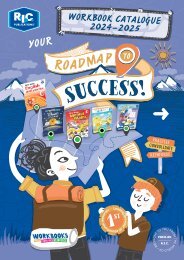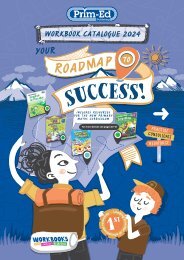RIC-20239 Primary Grammar and Word Study Year 4 – Understanding and choosing words
You also want an ePaper? Increase the reach of your titles
YUMPU automatically turns print PDFs into web optimized ePapers that Google loves.
Focus<br />
Suffixes ed, er <strong>and</strong> ing.<br />
Definition<br />
Underst<strong>and</strong>ing <strong>and</strong><br />
<strong>choosing</strong> <strong>words</strong><br />
• A suffix is a letter or group of letters added to the end<br />
of a base word to change its meaning <strong>and</strong> form a new<br />
word.<br />
Explanation<br />
• Generally, when a suffix is added to a base word, the<br />
spelling of both stays the same. There are a number of<br />
rules, however, when adding a suffix beginning with a<br />
vowel, such as ing, ed <strong>and</strong> er.<br />
• The final consonant must be doubled before adding<br />
the suffix to <strong>words</strong> of one syllable with a short vowel<br />
followed by a consonant.<br />
Example:<br />
hop <strong>–</strong> hopped, run <strong>–</strong> running<br />
This rule also applies to <strong>words</strong> of two or more<br />
syllables, provided the accent falls on the last<br />
syllable.<br />
Example:<br />
forget <strong>–</strong> forgotten<br />
Exceptions are bus, gas <strong>and</strong> <strong>words</strong> that end in w.<br />
• Consonants are not doubled after a long or double<br />
vowel,<br />
Example:<br />
clean <strong>–</strong> cleaning, sleep <strong>–</strong> soaking<br />
• In <strong>words</strong> ending in a silent e, the e is usually dropped.<br />
Example:<br />
hope <strong>–</strong> hoping, please <strong>–</strong> pleasing, tune <strong>–</strong> tuning<br />
• <strong>Word</strong>s ending in ac or ic, add a k before the suffix,<br />
Example:<br />
panic <strong>–</strong> panicked, mimic <strong>–</strong> mimicking,<br />
picnic <strong>–</strong> picnicker<br />
• <strong>Word</strong>s that ends in y, change the y to an i before<br />
adding the suffix (e.g. easy<strong>–</strong>easiest), unless a vowel<br />
comes before it (e.g. play<strong>–</strong>played) or the suffix is ing<br />
(e.g. carrying, hurrying).<br />
• There are some exceptions to these rules.<br />
• Knowing the meanings of common suffixes may assist<br />
students to work out the meaning of unfamiliar <strong>words</strong>. A<br />
sound knowledge of suffixes will also help students spell<br />
correctly <strong>and</strong> develop their vocabulary. An underst<strong>and</strong>ing<br />
of suffixes can also help students identify which part of<br />
speech (noun, verb, adjective, adverb) the word belongs to.<br />
Worksheet information<br />
• By completing this worksheet, students should discover<br />
for themselves at least one of the rules regarding adding<br />
these suffixes to certain base <strong>words</strong>.<br />
Suffixes<br />
• Read the introduction <strong>and</strong> check for student<br />
underst<strong>and</strong>ing. Allow students to look at the text in their<br />
own time <strong>and</strong> underline <strong>words</strong> which have a base that<br />
changes spelling when the suffix is added. Provide<br />
dictionaries for student reference if necessary. Students<br />
then complete the <strong>words</strong>earch, locating new <strong>words</strong><br />
created from the base <strong>words</strong> by the addition of suffixes.<br />
• In Question 3, students write one rule they observed.<br />
• As a follow-up activity, ask students to share some<br />
of the rules they have discovered. Write the correct<br />
rules on a chart to put up in the classroom for student<br />
reference.<br />
• Teachers could choose to follow this activity with a more<br />
in-depth study of the rules pertaining to adding certain<br />
suffixes to certain <strong>words</strong> as listed above.<br />
• It is important that students realise there are exceptions<br />
to most of these rules. They should be encouraged to<br />
identify exceptions <strong>and</strong> to share them with the class.<br />
Ideas for further practise<br />
• <strong>and</strong> are online<br />
interactive activities where students can practise adding<br />
these suffixes.<br />
• Send students on a ‘suffix hunt’ around the classroom<br />
to try to find <strong>words</strong> that have changed spelling once a<br />
suffix has been added.<br />
• At http://teacher.scholastic.com/activities/adventure/<br />
grammar4.htm# students can practise adding ed <strong>and</strong><br />
ing to <strong>words</strong> in the fishing game.<br />
Answers<br />
1. winner (double n), announcer (silent e is dropped),<br />
winner (double n), cried (y changed to i), excited<br />
(silent e is dropped), confused (silent e is dropped),<br />
happier (y changed to i), picnicking (k added before<br />
ing), tail-waggers (double g).<br />
©R.I.C. Publications<br />
Low Resolution Images<br />
Display Copy<br />
2. cry-cried, marry-married, win-winning,<br />
move-moving, play-played, try-tried, wag-wagging,<br />
hurry-hurrying, dig-digging<br />
q e e m o v i n g w<br />
l p l a y e d i m a<br />
n p t r i e d n i g<br />
h u r r y i n g o g<br />
u t w i n n i n g i<br />
c r i e d t r e s n<br />
n a q d i g g i n g<br />
3. Teacher check<br />
<strong>Primary</strong> grammar <strong>and</strong> word study 48<br />
www.ricpublications.com.au R.I.C. Publications ®

















